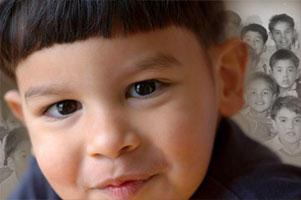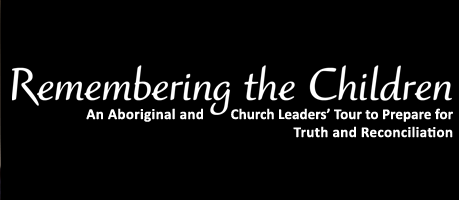

You are here:
The United Church of Canada and Indian Residential Schools
Until 1969, The United Church of Canada was involved with Canada's "Indian Residential School" system, which resulted in a painful legacy for many Aboriginal people and their communities.
During the 19th and early 20th century, federal policies were undergirded by a conviction that First Peoples needed to be assimilated into Western European culture. Children were removed from their families and communities to attend residential schools. By discouraging First Nations’ languages and cultural practices the schools played an important role in carrying out this policy of assimilation. There were day schools in some communities, but due to isolation and seasonal movements of First Peoples, it was often deemed more suitable to establish large residential schools in permanent settlements.
During the 19th century, both the Methodist and Presbyterian churches were highly committed to universal public education (for example, noted Canadian educator Egerton Ryerson was a Methodist minister). At the same time, there was little corporate understanding of the importance of cultural sensitivity in both education and gospel proclamation. Thus a mission goal of providing education and proclaiming the gospel was not tempered by respect for the existing culture, values and spirituality of First Nations.
With rare exceptions, the national policy of assimilation was not questioned by the churches. This uncritical approach to mission enabled the church to become an agent of government in promoting the schools. Between 1849 and 1925, the Methodists and Presbyterians operated a number of schools. In 1925, at the time of church union, the United Church assumed the responsibility for 12 schools of which the last one closed in 1969. The United Church also operated two residences (Kitimaat and Teulon) where children from out of the community attended day schools. In total, the Roman Catholic, Anglican Presbyterian and United churches operated some 130 Indian Residential Schools.
The United Church was involved in the following Indian Residential Schools: In British Columbia - Ahousaht, Alberni, Port Simpson, Coqualeetza; in Alberta – Edmonton and Morley; in Saskatchewan - Round Lake and File Hills; in Manitoba - Norway House, Brandon and Portage la Prairie; and in Ontario - Mount Elgin (Muncey). Of approximately 80,000 students alive today, about 10 percent attended United-Church run schools.
As the school system evolved, it was the federal government that set the standards and provided the funding (often inadequate) for the schools, and legally required children to attend. The church was involved in suggesting to the government potential principals for the schools and also hiring other staff. The name of The United Church of Canada was integral to the identity of the schools and, aside from a few voices rarely heard by those in power, gave unquestioned assent to the policy of assimilation that informed the school system.
"We now realize that the offering of the churches and of countless faithful and caring servants of the churches, through their participation in the residential school system has tragically resulted in pain and suffering and injustice for many...." Repentance Statement of the 36th General Council, 1997
In spite of the harm done by this system, some students speak positively of acquiring an education that allowed them to move forward in the “White man’s world,” to gain cross-cultural skills, and to provide leadership to their people in transition.
In the past 20 years, the United Church has begun a directed, prayerful, and concerted effort to become more informed and responsive to the harmful affects of the residential schools on First Nations peoples and cultures. In 1998, the church offered a formal apology to former students, their families and communities. In an amazing sign of God's grace among us, it has been the outstretched hands of many Aboriginal people that has offered an invitation to healing. The journey toward reconciliation requires a long-term commitment. Initial steps have included the church's Healing Fund, its participation in the claims settlement processes, advocacy for a Truth and Reconciliation Commission, collaboration in the historic Indian Residential School Settlement Agreement, archival research and increased resources for reconciliation and right relations work.
Links:
- United Church Residential Schools homepage
- Frequently asked questions regarding The United Church of Canada, residential schools, healing, and reconciliation:
- 1986 United Church Apology to First Nations Peoples
- 1998 United Church Apology to Residential School Survivors and their families